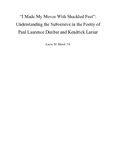| dc.rights.license | In Copyright | en_US |
| dc.creator | Morel, Lucas M. | |
| dc.date.accessioned | 2018-04-26T14:52:28Z | |
| dc.date.available | 2018-04-26T14:52:28Z | |
| dc.date.created | 2018 | |
| dc.identifier | WLURG38_Morel_ENGL_2018 | |
| dc.identifier.uri | http://hdl.handle.net/11021/34107 | |
| dc.description | Thesis; [FULL-TEXT FREELY AVAILABLE ONLINE] | en_US |
| dc.description | Lucas M. Morel is a member of the Class of 2018 of Washington and Lee University. | en_US |
| dc.description.abstract | Ever since the emergence of dialect speech into popular culture following the conclusion of the Civil War, black writers of vernacular in America have had to manage complicated relationships with both their white editors and their predominantly white reading public. On the one hand, writing dialect stories and poems that seem to render portraits of African-American communities as docile and unsophisticated entertained white readers and editors. This rather homogenous audience often found the literature enjoyable either for some perceived affirmation of their own racial prejudices or for its othering of the language spoken in these communities through exotic romanticization. On the other, this platform offered to dialect writers opened up a potential avenue of socio-political expression unavailable to black artists prior to Reconstruction. Likewise for the black rappers of today, who themselves function within a linguistic sphere separate from what many consider “standard English,” racially prejudicial stereotypes about the
genre and its influence on black life in America pervade much of the social discourse generated by the music, but the genre itself dominates popular culture; they too must operate artistically and expressively while speaking to an audience that includes a large segment of people who actively look to find fault and vice within rap lyrics to confirm their prejudicial understanding of the black American identity. The challenge then becomes, how does a black writer, or black rapper, navigate the space between meeting audience expectations and challenging their validity? [From Introduction] | en_US |
| dc.description.statementofresponsibility | Lucas M. Morel | |
| dc.format.extent | 65 pages | en_US |
| dc.language.iso | en_US | en_US |
| dc.rights | This material is made available for use in research, teaching, and private study, pursuant to U.S. Copyright law. The user assumes full responsibility for any use of the materials, including but not limited to, infringement of copyright and publication rights of reproduced materials. Any materials used should be fully credited with the source. | en_US |
| dc.rights.uri | http://rightsstatements.org/vocab/InC/1.0/ | en_US |
| dc.subject.other | Washington and Lee University -- Honors in English | en_US |
| dc.subject.other | Lamar, Kendrick | en_US |
| dc.title | "I Made My Moves With Shackled Feet": Understanding the Subversive in the Poetry of Paul Laurence Dunbar and Kendrick Lamar (thesis) | en_US |
| dc.type | Text | en_US |
| dcterms.isPartOf | RG38 - Student Papers | |
| dc.rights.holder | Morel, Lucas M. | |
| dc.subject.fast | Dunbar, Paul Laurence, 1872-1906 | en_US |
| dc.subject.fast | Vocal music -- Texts | en_US |
| dc.subject.fast | Rap (Music) | en_US |
| dc.subject.fast | Insurgency in literature | en_US |
| dc.subject.fast | Race discrimination in literature | en_US |
| local.department | English | en_US |
| local.scholarshiptype | Honors Thesis | en_US |
